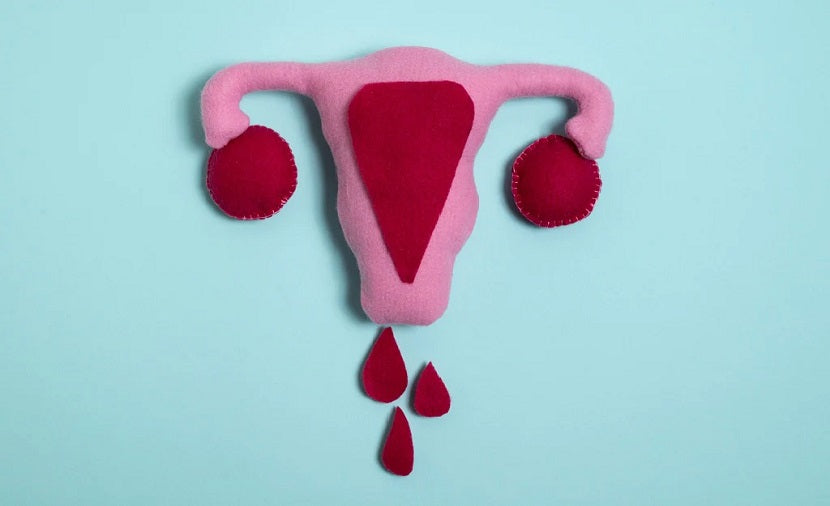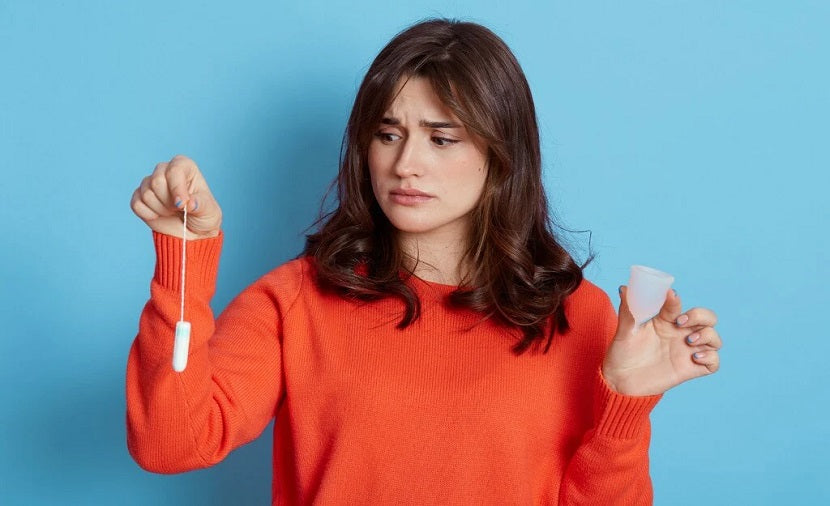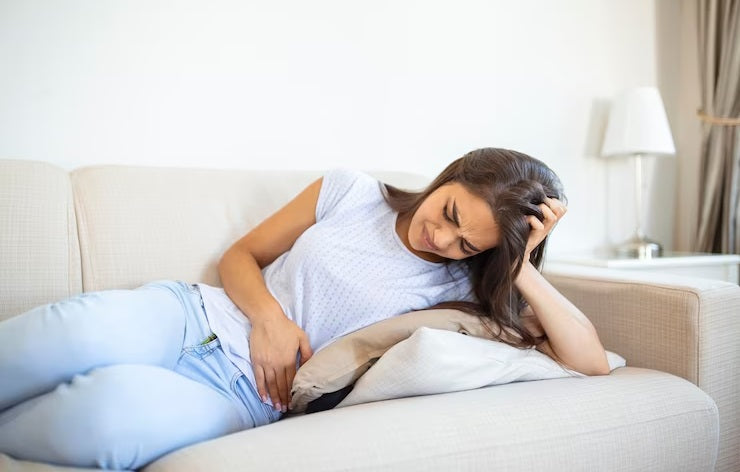What one woman may describe as a heavy period can greatly differ from what another woman experiences. Heavy menstrual bleeding is also referred to as menorrhagia, and it’s diagnosed when we lose more than 80 ml of blood during our cycle or when our bleeding continues for more than 7 days.
The following is a helpful guide to help you determine exactly how much 80 mL is.
- One regular soaked pad or tampon holds around 5 mL.
- A super tampon holds 10 mL.
- A menstrual cup typically holds around 25mL (but they do have markings on the side indicating to be sure).
That means you’d have to have more than 3 full menstrual cups over your bleed or 16 fully soaked tampons.
What causes a heavy period?
The primary cause of Heavy periods is excessive oestrogen coupled with a deficiency of progesterone. We call this oestrogen dominance. Women most commonly suffer from heavy bleeds because they’re not making enough progesterone through ovulation. This is why as menopause approaches, bleeds become longer and or heavier. It’s also part of the reason that young girls experience heavy or long bleeds at menarche; because they too are not yet making enough progesterone and/or ovulating regularly.

Heavy bleeding can also occur from overstimulation of the endometrium due to excessive or unbalanced oestrogen levels. Note that oestrogen thickens the uterine lining while progesterone thins it, reduces it, or stops bleeding completely. This is why progestin (synthetic hormone designed to mimic progesterone) is prescribed for heavy bleeding.
So what can cause this imbalance in oestrogen and progesterone?
- Poor hormone clearance via the Liver and Bowels
- Chronic stress
- Inflammation
- Thyroid disease
- Insulin resistance
- Inadequate dietary carbohydrates
- Inadequate body fat
- Iron deficiency
- Clotting abnormalities
- Hormone drugs
- Contraception and intrauterine devices
- Reproductive cancers
- Nutritional deficiencies (such as vitamin K)
- Poor metabolism/clearance of hormones through the bowel
These factors can all lead to reproductive conditions that are known for heavy bleeding including endometriosis, polycystic ovarian syndrome, fibroids, ovarian cysts, adenomyosis, pelvic inflammatory disease, endometrial hyperplasia, and polyps.

How to treat a heavy period
From a naturopathic perspective, it’s imperative to identify your drivers. WHY are your hormones imbalanced? Exploring this before reaching for medications can ultimately eliminate the long-lasting impact that hormone drugs have on the endocrine system.
Of course, some women (like those who hemorrhage monthly) need immediate relief found with medication just in order to live their lives. But the great thing is that it’s possible to also concurrently create hormonal balance with natural medicine such as Happy Healthy You’s Happy Period which helps with natural period pain relief.
Start by improving your oestrogen clearance. That means reducing the load off your liver and encouraging daily bowel motions and a happy gut. Think about cutting out alcohol, reducing additives, sugar, and exposure to toxins. And for extra supplemental support try our Happy Greens and Happy Liver. This is critical in managing Heavy periods.
- Take Period Pain Supplements such as Happy Period. We designed it specifically for irregular, and or heavy menstrual bleeds. It contains the TCM herb Tienchi Ginseng, specific for heavy bleeding.
- Take a break from (non-fermented dairy). It’s been found to form a peptide called BCM7 which can activate mast cells (mast cells release histamine which is another driver of heavy bleeds)
-
Eat well and eat enough. This is essential for monthly ovulation and progesterone production which lessens bleeding. Remember refined sugar is pro-inflammatory and both fibre and fermented foods help us eliminate oestrogen. The FREE Happy Hormones 8-week program is the perfect place to start your nutritional journey toward hormone health.
- Reduce your exposure to endocrine-disrupting chemicals (EDCs). EDCs mimic or partly mimic naturally occurring hormones in the body like oestrogens (the female sex hormone), androgens (the male sex hormone), and thyroid hormones, potentially causing overstimulation. For tips on how to reduce your exposure to EDCs, check out this article
-
Reduce inflammation. Prostaglandins are inflammatory chemicals produced to help the uterus contract and expel period blood. Both zinc and magnesium can inhibit the amount of prostaglandins released.
-
Eat phytoestrogens. Phytoestrogens attach to oestrogen receptors and either create a block when oestrogen is in excess or trigger oestrogen action when there’s a deficit. These include tempeh, legumes, sprouts, nuts, edamame, and flaxseeds.
- Ensure your iodine levels are up to scratch. The ovaries naturally contain some of the highest levels of iodine in the body. Iodine decreases oestrogen sensitivity by down-regulating oestrogen receptors and improving the detoxification of oestrogen, thereby reducing causative factors of heavy periods.
Key Takeaway
Months of commitment is needed to truly encourage hormonal balance. However, I can assure you that it’s always a rewarding journey you’ll never regret. Healing a period is not a quick fix. If you want a healthy period, you have to work towards ovulating each cycle.
If you are looking for products to support you on your menstrual journey try our Healthy Cycle Bundle .










Leave a comment
This site is protected by hCaptcha and the hCaptcha Privacy Policy and Terms of Service apply.